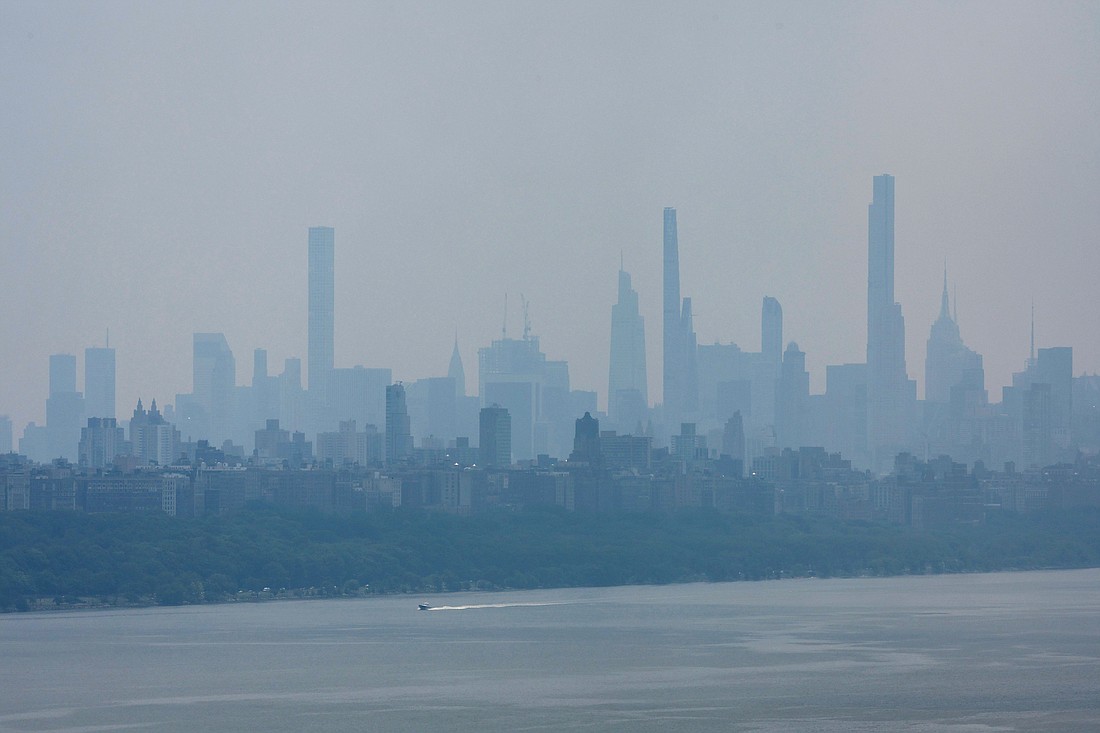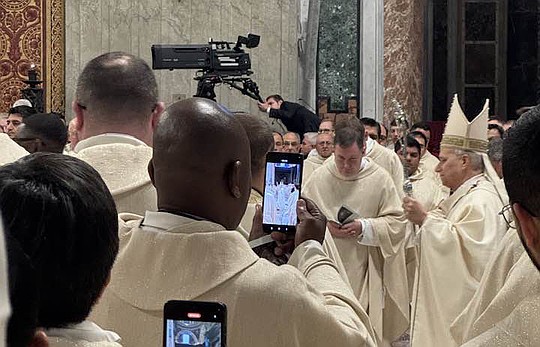Initial impressions of Pope Francis’ ‘Laudate Deum’
October 4, 2023 at 3:25 p.m.

A reflection from Bishop David M. O’Connell, C.M., on the Apostolic Exhortation on the environment issued by the Holy Father Oct. 4, 2023
Our Holy Father Pope Francis has released his Apostolic Exhortation “Laudate Deum” (“Praise God”) on the memorial feast day of St. Francis of Assisi, one of history’s most popular Catholic saints, renowned for his love of nature and all of God’s creation. Clad in the only later-worn, distinctive robes of the Franciscan religious order, St. Francis is most often fondly portrayed with arms lovingly outstretched and surrounded by earth’s creatures. In a departure from the traditional list of papal names, the Jesuit Holy Father chose to be called by the name “Francis,” the first pope ever to do so. That one action, in itself, was considered to be an indication that his would be a “different” kind of pontificate from those of his predecessors. That anticipation has proved to be true.
To read the full text of Laudate Deum, click here.
Related Story: Pope, in document on climate crisis, criticizes science 'deniers'
“Laudate Deum” is an apostolic companion piece to Pope Francis’ May 24, 2015 second encyclical letter, "Laudato Si' (“Praised Be”) in which he focused on the natural environment and the moral responsibility of all human beings to “care for our common home” — the encyclical’s subtitle — and for one another in its preservation. Considerably shorter than its 184-page encyclical counterpart, the Apostolic Exhortation “Laudate Deum” takes on a much more urgent tone, unabashedly critical of the lack of effort on the part of “many groups and organizations within civil society” to take the global climate crisis seriously and “to compensate for the shortcomings of the international community, its lack of coordination in complex situations, and its lack of attention to fundamental human rights.”
Quoting the 2019 statement of the United States Conference of Catholic Bishops’ “Global Climate Change Background,” Pope Francis reaffirms, “our care for one another and our care for the earth are intimately bound together. Climate change is one of the principal challenges facing society and the global community. The effects of climate change are borne by the most vulnerable people, whether at home or around the world.”
The Holy Father observes, “We will feel its effects in the areas of health care, sources of employment, access to resources, housing, forced migrations, etc.” In the eight years that have passed since his encyclical on the environment, Pope Francis laments that he has “realized that our responses have not been adequate, while the world in which we live is collapsing and may be nearing the breaking point.”
Prompted by the immediacy of those concerns generated by the current global climate and ecological crisis, the Holy Father cautions that “despite all attempts to deny, conceal, gloss over or relativize the issue, the signs of climate change are here and increasingly evident” and cannot be ignored. “We have witnessed” these signs “and cries of protest on the part of the earth” virtually everywhere.
Pope Francis reminds all Catholics and people of good will to whom this exhortation is addressed that the fundamental context and motivation urging — even demanding — our common response is, indeed, spiritual and “born of their faith” since “we know that authentic faith not only gives strength to the human heart but also transforms life, transfigures our goals and sheds light on our relationship to others and with creation as a whole.”
We have consistently heard from factions that reject the teachings articulated by Pope Francis in “Laudato Si’” and we can expect there to be similar criticism of “Laudato Deum.” It should be made clear that an Apostolic Exhortation written by the pope is a magisterial document that ranks third in importance of papal teachings after Apostolic Constitutions and Encyclicals.
As I have written and repeated since the release of “Laudato Si,’” the Holy Father’s call for all people, especially people of faith, to be stewards of our “common home” is not a negligible part of our faith and morality. If the believer ignores responsibility for the world in which we live, the resources it provides and the people with whom we share them, what can we possibly expect from those who do not believe? If we show no regard or respect for the divine plan for creation, what can we say of human plans, human possibilities, human hopes for a sustainable future?
I pray that the Holy Father’s vigilant attention to the threats to our “common home” -- which fundamentally includes every human life -- falls upon fertile ground, converting our hearts and inspiring us all to do whatever we can to make a positive difference.
Related Stories
Thursday, January 08, 2026
E-Editions
Events
A reflection from Bishop David M. O’Connell, C.M., on the Apostolic Exhortation on the environment issued by the Holy Father Oct. 4, 2023
Our Holy Father Pope Francis has released his Apostolic Exhortation “Laudate Deum” (“Praise God”) on the memorial feast day of St. Francis of Assisi, one of history’s most popular Catholic saints, renowned for his love of nature and all of God’s creation. Clad in the only later-worn, distinctive robes of the Franciscan religious order, St. Francis is most often fondly portrayed with arms lovingly outstretched and surrounded by earth’s creatures. In a departure from the traditional list of papal names, the Jesuit Holy Father chose to be called by the name “Francis,” the first pope ever to do so. That one action, in itself, was considered to be an indication that his would be a “different” kind of pontificate from those of his predecessors. That anticipation has proved to be true.
To read the full text of Laudate Deum, click here.
Related Story: Pope, in document on climate crisis, criticizes science 'deniers'
“Laudate Deum” is an apostolic companion piece to Pope Francis’ May 24, 2015 second encyclical letter, "Laudato Si' (“Praised Be”) in which he focused on the natural environment and the moral responsibility of all human beings to “care for our common home” — the encyclical’s subtitle — and for one another in its preservation. Considerably shorter than its 184-page encyclical counterpart, the Apostolic Exhortation “Laudate Deum” takes on a much more urgent tone, unabashedly critical of the lack of effort on the part of “many groups and organizations within civil society” to take the global climate crisis seriously and “to compensate for the shortcomings of the international community, its lack of coordination in complex situations, and its lack of attention to fundamental human rights.”
Quoting the 2019 statement of the United States Conference of Catholic Bishops’ “Global Climate Change Background,” Pope Francis reaffirms, “our care for one another and our care for the earth are intimately bound together. Climate change is one of the principal challenges facing society and the global community. The effects of climate change are borne by the most vulnerable people, whether at home or around the world.”
The Holy Father observes, “We will feel its effects in the areas of health care, sources of employment, access to resources, housing, forced migrations, etc.” In the eight years that have passed since his encyclical on the environment, Pope Francis laments that he has “realized that our responses have not been adequate, while the world in which we live is collapsing and may be nearing the breaking point.”
Prompted by the immediacy of those concerns generated by the current global climate and ecological crisis, the Holy Father cautions that “despite all attempts to deny, conceal, gloss over or relativize the issue, the signs of climate change are here and increasingly evident” and cannot be ignored. “We have witnessed” these signs “and cries of protest on the part of the earth” virtually everywhere.
Pope Francis reminds all Catholics and people of good will to whom this exhortation is addressed that the fundamental context and motivation urging — even demanding — our common response is, indeed, spiritual and “born of their faith” since “we know that authentic faith not only gives strength to the human heart but also transforms life, transfigures our goals and sheds light on our relationship to others and with creation as a whole.”
We have consistently heard from factions that reject the teachings articulated by Pope Francis in “Laudato Si’” and we can expect there to be similar criticism of “Laudato Deum.” It should be made clear that an Apostolic Exhortation written by the pope is a magisterial document that ranks third in importance of papal teachings after Apostolic Constitutions and Encyclicals.
As I have written and repeated since the release of “Laudato Si,’” the Holy Father’s call for all people, especially people of faith, to be stewards of our “common home” is not a negligible part of our faith and morality. If the believer ignores responsibility for the world in which we live, the resources it provides and the people with whom we share them, what can we possibly expect from those who do not believe? If we show no regard or respect for the divine plan for creation, what can we say of human plans, human possibilities, human hopes for a sustainable future?
I pray that the Holy Father’s vigilant attention to the threats to our “common home” -- which fundamentally includes every human life -- falls upon fertile ground, converting our hearts and inspiring us all to do whatever we can to make a positive difference.










